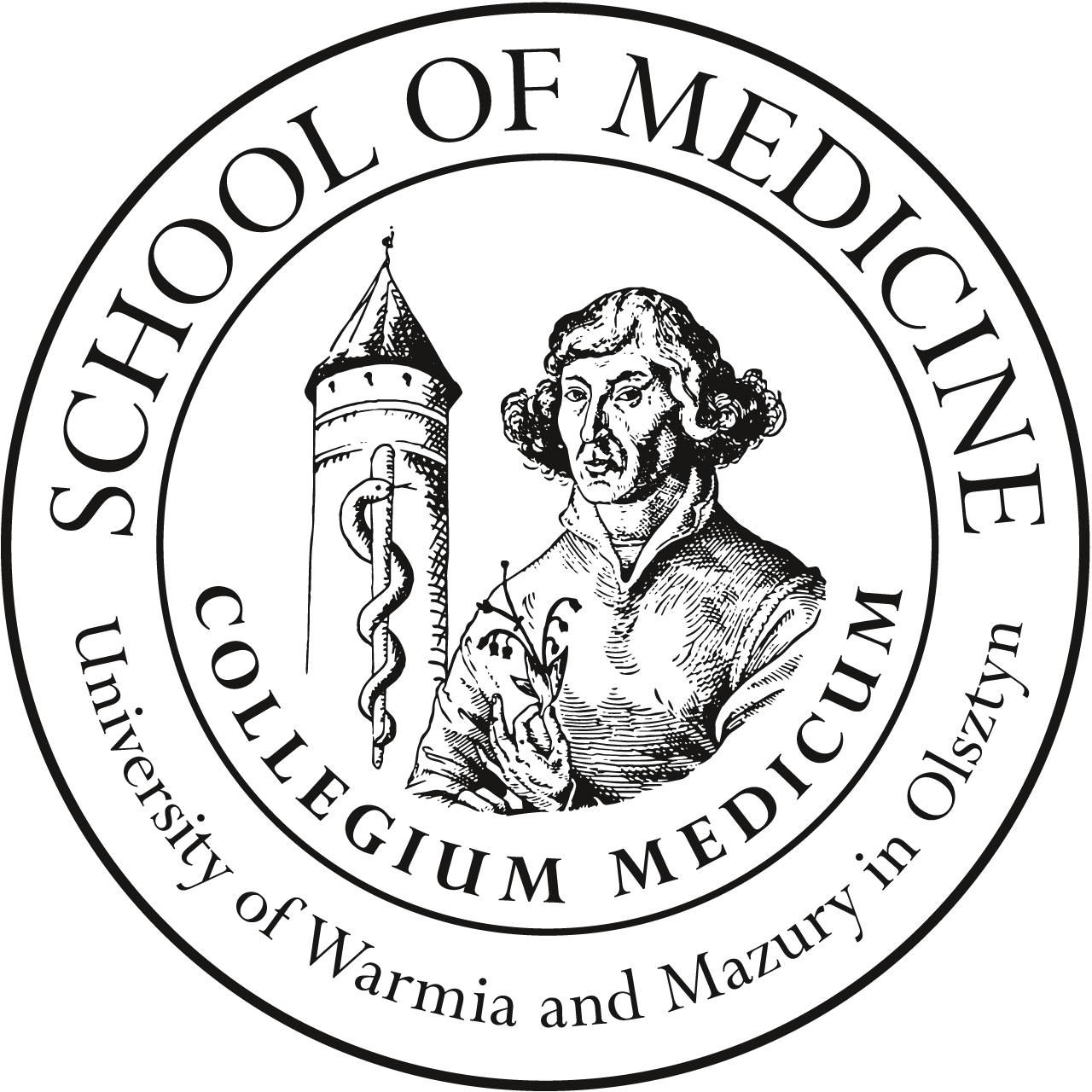CLASS TOPICS
[Cardiology/Gastroenterology/Pulmonology/Infectious Diseases/ Oncology and Haematology/Neonatology/ Neurology/ Rheumatology/Allergology]
To participate in the practical classes, students have to fulfill the condition – knowledge of the topics from previous years.
ATTENTION: The sequence of topics may change during the semester according to the schedule for Pediatrics. Due to the wide range of material, we recommend earlier preparation.
A test, which covers the topic from the particular exercise and the material from the previous years, will be taken before every practical class.
Classes will take place in the Regional Specialistic Children’s Hospital in Olsztyn or in the
Medical Simulation Center
8.15 – 11.15 | the practical classes will take place in the wards of the Regional Specialistic. Children’s Hospital according to the Schedule in five-person group. Student under the teacher supervision will participate in history taking, physical examination, differential diagnosis, interpretation of the laboratory test, plan the consultations, treatment and the follow up of the patients from the wards or OPD. He will also attend the rounds and discussion of the medical cases. |
11.15 – 11.30 | Break |
11.30 – 13.00 | decision making by the patients bed. Classes in the ten person group will take place in the seminar room in the Regional Specialistic Children’s Hospital or in the Medical Simulation Center. Student should beprepare for each class according to the listed topics. Every day the test will be taken, containing of the 5 MCQ questions or 5 open questions from current topics and from the previous years. |
Before the class the student should know the anatomy and physiology of the cardiovascular system and previous topics from cardiology.
Topic 1: Syncope. Cardiac arrhythmias. Hypertension.
Differentials diagnosis, diagnostics procedures, treatment.
Before the class the student should know the anatomy and physiology of the GI truck, liver, pancreas, bilirubin metabolism, previous topic from gastroenterology and nutrition.
Topic 1: Inflammatory-bowel disease in children.
Ulcerative colitis, Crohn’s disease, non-specific colitis. Clinical presentation, differentia diagnostics, laboratory testing, endoscopy, imaging, pharmacological treatment, biological treatment, feeding therapy, complications. Discussion of the selected cases.
Topic 2: Chemical Burns of the esophagus. Gastrointestinal foreign bodies. Bleeding of the lower part of the gastrointestinal tract: IBD, juvenile polyps, Meckel’s diverticulum. Esophageal varices bleeding.
Clinical presentation, differentia diagnostics, laboratory testing, endoscopy, imaging, pharmacological treatment, feeding therapy, complications. Discussion of the selected cases.
Topic 3: Short bowel syndrome. Enteral and prenatal nutrition - indications.
Enteral and parenteral nutrition – indications. Percutaneous endoscopic gastrostomy (PEG) –indications. Enteral nutrion formulas. Special diets in children. Discussion of the selected cases.
Topic 4: Pancreatic disorders in children. Cystic fibrosis. Congenital diarrhea disorders. Short gut syndrome.
Pathogenesis, diagnosis, treatment.
Before the class student should know the anatomy and physiology of the respiratory system, previous topics from pulmonology, fever – etiology, types, antipyretics. Dehydration in children – etiology, types, treatment of the acute viral diarrhea, oral rehydration fluids.
Topic 1: Asthma, bronchiolitis, laryngitis, fever in children. Dehydration. Fluid therapy.
Clinical presentation, differential diagnosis, laboratory test and imaging. Discussion of the selected cases.
Before the class student should know etiology of the viral and bacterial diseases in children – transmission, incubation period, symptoms, diagnostics, treatment, prevention. Medications: anti-viral, antibiotics. Vaccinations: types, schedule, contraindications, adverse event.
Topic 1: Sepsis. Invasive pneumococcal disease. Meningitis.
Etiology:bacterial -Neisseria meningitidis, Streptococcus pneumoniae, Haemophilus influenzae, Escherichia coli, Streptococcus group B, Staphylococcus aureus, Mycobacterium tuberculosis, Listeria monocytogenes, viral.
Transmission, clinical presentation, differences in children, differential diagnosis, treatment, complications, prevention.
Discussion of the selected cases.
Topic 2: Vaccination in the special situations.
Vaccination of the children with the congenital and acquired immunodeficiency syndrome, chronic diseases. Emergency vaccines: tetanus and rabies. Management of the parental refusal to the vaccinations. Discussion of the selected cases.
Before the class student should know the parts and physiology of the haematopoietic system, lymphoid organs, immune system (humoral and cell-mediated immunity, antibodies), previous topics from the oncology and hematology.
Topic 1: Symptomatology, taking history, physical examination in oncology and hematology.
Epidemiology. Oncogenesis. Cases presentation.
Topic 2: Solid tumors in children:
Neuroblastoma, Wilm’s tumor, tumors of the bones (osteosarcoma, Ewing’s sarcoma), soft tissue tumors, liver tumors, germ cell tumor, histiocytosis, CNS tumors. Hemangiomas and congenital malformations in children. Principles of the diagnostics procedures, therapy. Cases presentation – interpretation of the laboratory test and images. TNM staging system.
Topic 3:Oncological emergencies.
Early complications of the antineoplastic therapy in children. Late effects of treatment for cancer, bone marrow transplantation. Outpatient care of the child during the antineoplastic therapy. Follow – up after the treatment. Cases presentation.
Topic 4: Immunodeficiency disorders in children.
Symptomatology of the immunodeficiency disorders. Primary immunodeficiency disorders in children: shortage of subclasses IgG, isolated IgA deficiency, common variable immunodeficiency (CVID), severe combined immunodeficiency (SCID) ,X-linked agammaglobulinemia, Wiskott –Aldrich syndrome, ataxia0telangiectasia, hyper – IgM syndrome, hyper – IgE syndrome, resistance syndromes associated with lymphocytes T, congenital neutropenia, chronic granulomatous disease. Acquired immunodeficiency disorders in children. Diagnostic, therapeutic management, treatment programms. Case presentation.
Before the class student should know the anatomy and physiology of the muskuloskeletar system, humoral and cell-mediated immunity, types of the antibodies, adaptive immune system, non-specific immune system, major histocompatibility complex, cytokines, autoimmunity.
Topic 1:Diagnosis of rheumatic diseases in children. Differences in the course of connective tissue diseases in children.
Clinical presentation, differential diagnosis, laboratory tests, imaging, follow-up. Discussion of the selected cases.
Topic 2: Differential diagnosis of arthritis in children.Reactive arthritis. Juvenile rheumatoid arthritis.
Clinical presentation, differential diagnosis, laboratory tests, imaging, follow-up. Discussion of the selected cases.
Before the class a student should know the anatomy and physiology of the CNS, milestones in children, psychomotor development assessment, principles of the neurological exam in children.
Genetics basis of the neurological disorders.
Topic 1: Neurological examination in children. Cerebral palsy. Epilepsy. Non-epileptic seizures. Febrile seizures.
Clinical presentation, differentia diagnosis, laboratory test and imaging, treamtent. Discussion of the selected cases.
Topic 2: Headaches. Neurodegenerative disorders in children.
Clinical presentation, differentia diagnosis, laboratory test and imaging, treamtent. Discussion of the selected cases. Follow up.
ATTENTION: in each class block one meeting will be carried out in the Medical Simulation Center.
Topic: Resuscitation of a newborn baby.
Topic 1: Complications of the prematurity.
Bronchopulmonary dysplasia, retinopathy of prematurity, necrotizing enterocolitis, intraventricular hemorrhages, hypoxic-ischemic encephalopathy.
Topic 2: Neonatal infections.
Early and late – onset infections (GBS). Maternal to fetal infections, TORCH , CMV.
Topic 3: Neonatal emergencies.
Severe congenital malformations. Neonatal seizures. Metabolic disorders. Pathological jaundice.
Before the class the student should know: humoral and cell-mediated immunity, IgE –reaction: pathomechanism, the most common allergens, clinical presentation of the urticaria, angioedema, anaphylaxis, oral allergy syndrome, treatment, characteristic and pharmacokinetics of the antihistamine medications, glucocorticosteroids, epinephrine.
Topic 1: Anaphylaxis in children.
Common causes (food, medications,insect venom), diagnosis, management, treatment. Medications in treatment. Follow up of the children with IgE food allergy. EpiPens.


